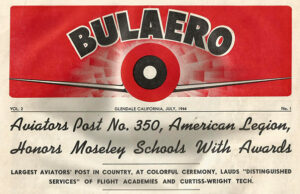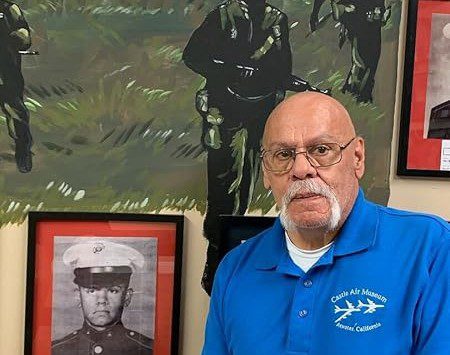by Bob Alvis, special to Aerotech News
Thumbing through an old copy of Bulaero, the base paper for Lancaster’s War Eagle Field in World War II, a small article titled “Are the days of miracles past?” caught my eye.
After reading it a couple of times, I set a course to find out some more about the “miracle.” I suppose it’s not too surprising that not much was out there in the information world (miracles are mysterious by nature, after all), but the one thing that had me really scratching my head was an article posted just this year from over San Bernardino way, referencing the same incident written about in my old copy of Bulaero. First, let’s take a look at the original account of that famous flight.
Heroic performances, perhaps more often than we think, rest on the sublime faith that with the help of God, all things are possible. Imbued with such faith, the soldiers of World War II, our American boys and Allies on a thousand foreign fields, were achieving what would be impossible to them without it.
The story of one hero, Sgt. Harry M. Hayes from San Antonio, Texas, was first inked by Whitney Bolton in his column in the Newark Evening News.
“Hayes, with only the slightest knowledge of flying any kind of plane, took the most difficult of flying instruments — the B-17 Flying Fortress — from Java to Australia. One thousand three hundred miles, without charts or maps; the plane faltering; overloaded with 18 men, women and children, (and) landed it without flaps — a miracle all by itself, and delivered the refugees unharmed. Ten minutes later, an astonished, stunned board of air corps officers forthwith declared the giant plane useless and unfit for service of any kind and had it dismantled.
“His Flying Fortress (had) taken off with four hundred feet less runway than an empty plane of its type is supposed to need; but this shot, battered, patched giant, carrying hundreds of pounds more weight than a new one could or should, got off and was airborne with plenty of runway footage to spare.
“The engines had been rebuilt by frantic Dutch mechanics while the airfield in Java was constantly being bombed by the Japanese. Pieces of two other planes were used to patch this Flying Fortress.
Eighteen desperate men, women and children were packed into its aluminum shell and then Hayes climbed aboard, sat down in the wreck and gunned it, felt his way with the controls and got it wobbling into the air. He turned its nose to the sea and prayed he would find Australia. His instrument board lacked most of the gauges that would be deemed essential, but he flew it, kept it airborne and when he found Australia and the field, he brought that weighted, war-shattered crate down without wing flaps to check his speed and keep it balanced, and he landed it as softly as a feather.

“The Prayer, ‘Hold thou me up and I shall be safe’ is one that the air pilot may well make with its attendant realization. Prayer is the first and chief essential.”
Only those who have piloted an aircraft can appreciate to the full the rich, tremendous miracle of this flight. Not a pilot or an officer — more a mechanic, with a slight feel for piloting — Hayes took 18 doomed souls to safety in a plane “held together” with string, chewing gum, wire, canvas and a prayer. The average competent pilot used to large military craft would think a long time before attempting that flight in one of those giant fortresses. He would want a trained copilot, at least a few hours of dual instruction, and most certainly along with full fuel tanks and a flawless oiling system, he would want flaps.
In times of desperation, something happens to man. It happened to Sergeant Hayes. Faith is not a much-talked about subject when it comes to the exploits of men facing pressure in combat situations, but the story of Sergeant Hayes and his gigantic feat cannot close without stating that if a man ever needed some sign that there is a divine power which helps those in need, this would have been the time. Hayes needed it on that flight and with all things considered, that a precious cargo of men, women and children safely made this astonishing flight seems to me to be reliable proof that, on that flight, he received it.
After reading this story, I noticed that it was released by the Associated Press in World War II and I went digging for more to the story and to see if I could learn more about Sergeant Harry M. Hayes, but the many wells of information I went to have come up pretty dry. I did find this story and its account on the bomber group’s web page, but it was lacking any more detail than this original World War II-era article shared.
Now for the real mystery: while researching this story, I came across a website from a reporter for a paper over in San Bernardino that was published just this summer and, to my amazement, he told the story pretty much as I have done here — but instead of Sergeant Hayes being the hero, a local man named Gerald Leo Cherymisin was named as the pilot of this miracle flight!
The story is a reality, as it does have legs in the Associated Press and other local newspaper archives. Even my copy of Bulaero can attest to it, but somewhere along the way it appears to have disappeared into a fog bank and emerged bearing some elements of legend. Maybe some time in the future, a person will come forth with a bit more information about this story, and the reason we now have two different pilots performing the miracle flight. Just a couple shades off from being a Twilight Zone episode, but with miracles and divine intervention, I’m not going to mess with the reasons surrounding this one!
Until next time, Bob Out …












